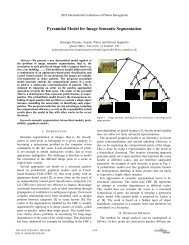Abstract book (pdf) - ICPR 2010
Abstract book (pdf) - ICPR 2010
Abstract book (pdf) - ICPR 2010
- TAGS
- abstract
- icpr
- icpr2010.org
Create successful ePaper yourself
Turn your PDF publications into a flip-book with our unique Google optimized e-Paper software.
ThCT2 Anadolu Auditorium<br />
Classification - III Regular Session<br />
Session chair: Tortorella, Francesco (Univ. degli Studi di Cassino)<br />
15:40-16:00, Paper ThCT2.1<br />
Nearest Archetype Hull Methods for Large-Scale Data Classification<br />
Thurau, Christian, Fraunhofer IAIS<br />
This paper introduces an efficient geometric approach for data classification that can build class models from large amounts<br />
of high dimensional data. We determine a convex model of the data as the outcome of convex hull non-negative matrix<br />
factorization, a large-scale variant of Archetypal Analysis. The resulting convex regions or archetype hulls give an optimal<br />
(in a least squares sense) bounding of the data region and can be efficiently computed. We classify based on the minimum<br />
distance to the closest archetype hull. The proposed method offers (i) an intuitive geometric interpretation, (ii) single as<br />
well as multi-class classification, and (iii) handling of large amounts of high dimensional data. Experimental evaluation<br />
on common benchmark data sets shows promising results.<br />
16:00-16:20, Paper ThCT2.2<br />
A Bound on the Performance of LDA in Randomly Projected Data Spaces<br />
Durrant, Robert John, Univ. of Birmingham<br />
Kaban, Ata, Univ. of Birmingham<br />
We consider the problem of classification in nonadaptive dimensionality reduction. Specifically, we bound the increase in<br />
classification error of Fisher’s Linear Discriminant classifier resulting from randomly projecting the high dimensional<br />
data into a lower dimensional space and both learning the classifier and performing the classification in the projected<br />
space. Our bound is reasonably tight, and unlike existing bounds on learning from randomly projected data, it becomes<br />
tighter as the quantity of training data increases without requiring any sparsity structure from the data.<br />
16:20-16:40, Paper ThCT2.3<br />
Adaptive Incremental Learning with an Ensemble of Support Vector Machines<br />
Kapp, Marcelo N., École de Tech. Supérieure - Univ. of Quebec<br />
Sabourin, R., École de Tech. Supérieure<br />
Maupin, Patrick, Defence Res. and Development Canada<br />
The incremental updating of classifiers implies that their internal parameter values can vary according to incoming data.<br />
As a result, in order to achieve high performance, incremental learner systems should not only consider the integration of<br />
knowledge from new data, but also maintain an optimum set of parameters. In this paper, we propose an approach for performing<br />
incremental learning in an adaptive fashion with an ensemble of support vector machines. The key idea is to track,<br />
evolve, and combine optimum hypotheses over time, based on dynamic optimization processes and ensemble selection.<br />
From experimental results, we demonstrate that the proposed strategy is promising, since it outperforms a single classifier<br />
variant of the proposed approach and other classification methods often used for incremental learning.<br />
16:40-17:00, Paper ThCT2.4<br />
Margin Preserved Approximate Convex Hulls for Classification<br />
Takahashi, Tetsuji, Hokkaido Univ.<br />
Kudo, Mineichi, Hokkaido Univ.<br />
The usage of convex hulls for classification is discussed with a practical algorithm, in which a sample is classified according<br />
to the distances to convex hulls. Sometimes convex hulls of classes are too close to keep a large margin. In this paper, we<br />
discuss a way to keep a margin larger than a specified value. To do this, we introduce a concept of ``expanded convex<br />
hull’’ and confirm its effectiveness.<br />
17:00-17:20, Paper ThCT2.5<br />
Evolving Fuzzy Classifiers: Application to Incremental Learning of Handwritten Gesture Recognition Systems<br />
Almaksour, Abdullah, IRISA/INSA de Rennes<br />
Anquetil, Eric, IRISA/INSA<br />
- 291 -



